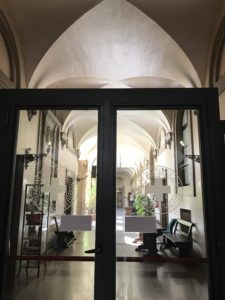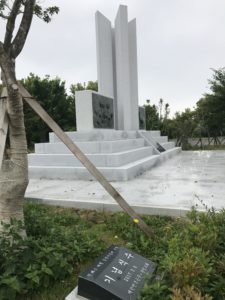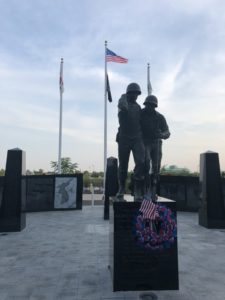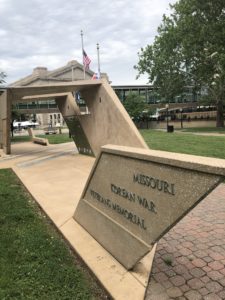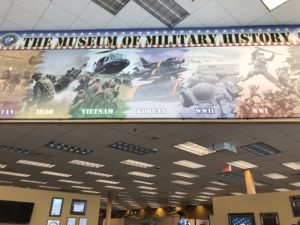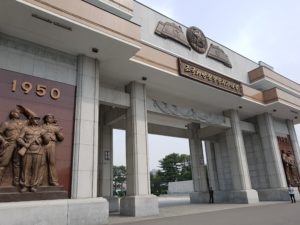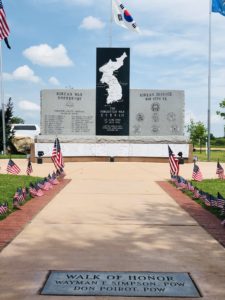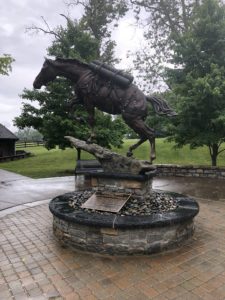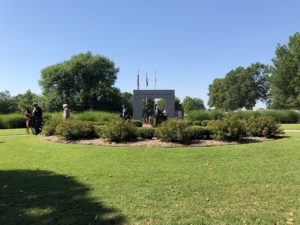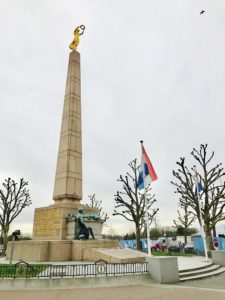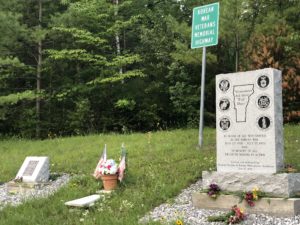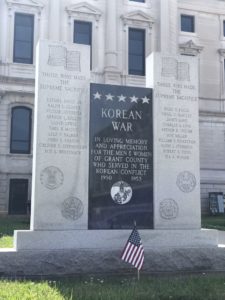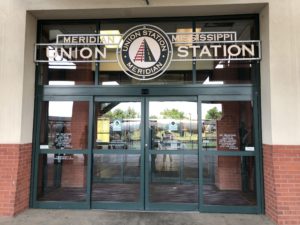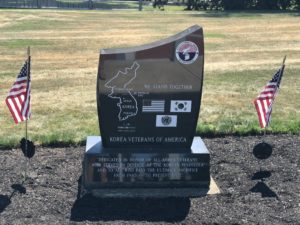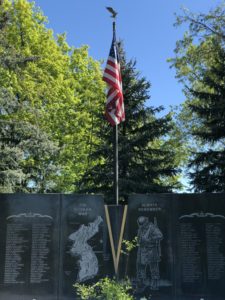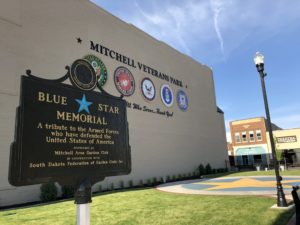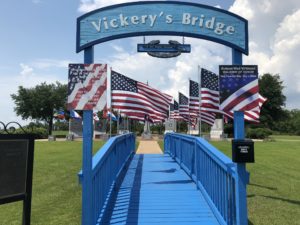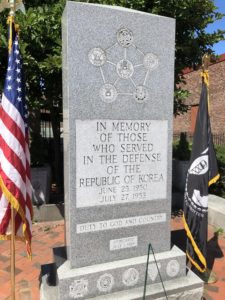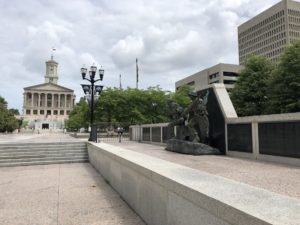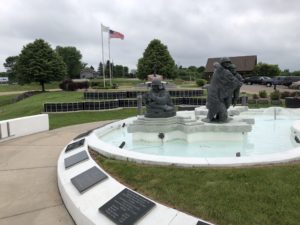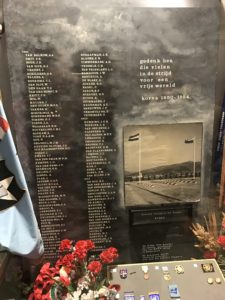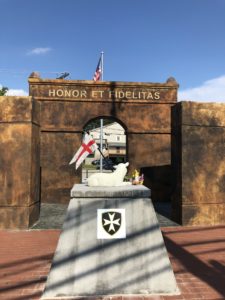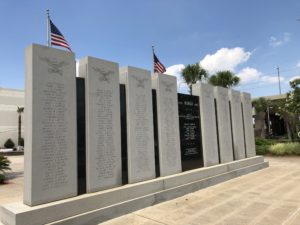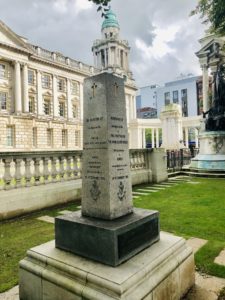>> [FOREIGN LANGUAGE].
>> So he’s the colonel lieutenant of the …
>> Claudio …
>> … Claudio …
>> … de Felici …
>> … de Felici …
>> [FOREIGN LANGUAGE].
>> … of the military corp …
>> Italian Red Cross.
>> … of the Italian Red Cross.
>> And we are in [FOREIGN LANGUAGE].
>> Okay. We are in the [INAUDIBLE].
>> [FOREIGN LANGUAGE].
>> We are in the room of the Red Cross where the personnel departed for the war in 1964.
>> [FOREIGN LANGUAGE].
>> October 16th, 1951.
>> [FOREIGN LANGUAGE].
>> So the hospital was operated from December 1951 to 1954 …
>> [FOREIGN LANGUAGE].
>> … and the personnel …
>> [FOREIGN LANGUAGE].
>> … were repatriated in …
>> [FOREIGN LANGUAGE].
>> … until the 10th of January …
>> [FOREIGN LANGUAGE].
>> … of 1955.
>> [FOREIGN LANGUAGE].
>> Mm-hmm. The hospital was composed of paramedics …
>> [FOREIGN LANGUAGE].
>> … medical officials …
>> [FOREIGN LANGUAGE].
>> … and …
>> Paramedic.
>> Paramedics, yeah.
>> [FOREIGN LANGUAGE].
>> Voluntary nurses …
>> [FOREIGN LANGUAGE].
>> … and Korean personnel …
>> [FOREIGN LANGUAGE].
>> … for the services …
>> Of the hospital.
>> … yeah, of the hospital.
>> [FOREIGN LANGUAGE].
>> The Korean authorities …
>> [FOREIGN LANGUAGE] the American authority.
>> … and the American authorities …
>> [FOREIGN LANGUAGE].
>> … of the …
>> [FOREIGN LANGUAGE].
>> … oh, of the coalition …
>> [FOREIGN LANGUAGE].
>> … oh, appreciated …
>> [FOREIGN LANGUAGE].
>> … the work …
>> [FOREIGN LANGUAGE].
>> … the work done by the Italian personnel …
>> [FOREIGN LANGUAGE].
>> … of hospital number 68, yeah.
>> Why was it called the hospital number 68?
>> I don’t remember.
>> [FOREIGN LANGUAGE].
>> Sixty-eight …
>> [FOREIGN LANGUAGE]. Now I don’t remember in this moment, but there is [FOREIGN LANGUAGE]. I don’t remember now because …
>> I’m very curious.
>> … this number.
>> I’m curious. I want to know, yeah.
>> [FOREIGN LANGUAGE].
>> Okay.
>> My name is Claudio de Felici. I am a lieutenant colonel of Italian Red Cross, and now we are in [INAUDIBLE] of headquarter of Italian Red Cross. [FOREIGN LANGUAGE].
>> How many people went to Korea?
>> One hundred people went to Korea to serve the fine hospital number 68 during the Korean War, and the hospital stayed in Korea from November 5 [FOREIGN LANGUAGE] 1951 to 1954 December. Italy went. They sent the hospital in Korea. Italy was not a part of the United Nation, but Italy is member wholly de NATO. Mamma mia.
>> My name is Joseph Wagner. I was during [INAUDIBLE] tough years in the Luxembourg Army, and one part of this occupation from back in the Korean War. I engaged in 1950, and I was sent to Korea with the Luxembourg detachment. All the people, they were volunteers. They had all volunteered, and we were attached to a Belgian battalion. We couldn’t afford to have a big force, to have all the logistical facilities, unit command, but we were all the time with Belgians attached to a Belgian company. And so we went, before the war, sent to a Belgian training camp. We did all the training which was useful for fight, for a soldier to be engaged in a war, and after that, we were sent to Korea on a Belgian boat. It was called the Kamina. We went on a Belgian boat, the Kamina, which was not very comfortable. We had very hard time during 6 weeks, being from one sea to the other, and we arrived. We started on the 13th of December, and we arrived in Korea on the 31st of January. It was a long way, yeah? So then we were received in a reception center. We went on training again, what we found out by contact foreign units who had already fought in the Korean War because we came in. Then the Chinese were already in the war. They started in November, and we arrived on the 31st January, and what I feel, we never saw a North Korean soldier. We were all the time engaged with Chinese because during the landing in Incheon, all the Korean units, they were cut off from their bases, and they had no contact from their bases anymore. And, well, our first mission was to fight them, and we had our first mission, was to control the communications of South Korea, and we were stationed in week one. Week one, that was our first mission. We were all the time patrolling the region to be sure that those people would not go making trouble in this area. And after that, we joined the third American division, and we were taken in offensive action that was south of Seoul. As I said, we had to … First crossing was the Han River, and then we went up with American units, with the third division, up to the 38th parallel. And from there, we trenched, our attachment. Then we were attached, the Belgian battalion was attached to the 29th British brigade, commanded by General Brodie. General Brodie, he was a jungle fighter, and when they sent him to Korea, there were only mountains and stones, no jungle at all. And, well, we were attached to this unit, to the 29th brigade, and then came the backlogged [INAUDIBLE] on the 23rd of April, and I was sent out on a patrol from the 12th to the 13th of April, and the Chinese, they were nowhere. Nobody knew where they were, because we had so many patrols during the night. Every unit had to send out patrols, and when I was sent out, I had … My mission was to see if a certain position was occupied, and when I came to this position, the position was occupied. We have a firefight with the Chinese occupation, and then we pulled out. We pulled out. We had one wounded, not by a bullet, but he was … He fell down on a certain position where he hit barbed wire or some kind of defense object. So we came back to our base, and I was called to the brigade’s operation officer, to the [INAUDIBLE] of the brigade, and then I told my story, that we were having contact with this position where we were both sent, and, well, that was very valuable information because 10 days after that, the war started. They started. The Luxembourg detachment was … North of the Imjin River was the other unit, the Luxembourg company, the Luxembourg … The Belgian battalion was north of the Imjin River, and all the other units from the brigade, the [INAUDIBLE], the oilers, the rifles, the [INAUDIBLE], they were south of Imjin River. And then when they attack, well, we had to, first of all, to hurt the position, 23 hours before we could move back, and we were already surrounded by the Chinese, and we were liberated, the help by air strike and by tank patrols. They cut the way from the Chinese, and so we had the chance to pull out, and then we went back. We went back, and during our retreat, we had, from time to time, what I call retreating operations. You had to occupy a position. You had to pull out. You had to occupy another position to make the aggressor that came from time to time on the resistance. And then we kind of came back to, well, south of Seoul. I don’t know the town anymore, and then we were on reserve of the brigade because the brigade was not operative anymore because they had already lost so many. They had lost one battalion. They lost the battalion, was wiped out on their position on the Imjin, and so the brigade was what we call in reserve. And after that, we were patrolling, all the time, the Imjin River, and that is where we had two wounded, two wounded on the night patrol, and we … Because the Chinese had all the time infiltrators across the Imjin River, and they were patrolling the whole region every night, every night. So we had two wounded, and they were evacuated to Japan, and when they had been, the treatment was up, they came back to our position. They came back to our position again. And, well, from there, we came also on a very comfortable situation because we were also reserve of the brigade. And from there, we stayed on the position making patrols on the level of the battalion, what they called a sweep, a coup de ballet, a sweep, to find out where the Chinese were because the Chinese, after our offensive action, they had been thrown out. They had been thrown out. And then of the first of July, we had very big operation, the Luxembourgers with Belgian battalion, Belgian company, and that was, we had to occupy the bridge head across the Imjin River. The bridge head, we had to make our position and when we moved up, we crossed by boat. The Imjin River was very swollen. It was very high, and we crossed by boat, and the British engineer troops, they took us along. And when we came on the other side, there were some people left on the village. They said, “Well, they are 800 men who have just left the position we occupied,” where we should occupy our bridge head. And after that, after we were occupied, we were attacked by enemy fire, by Chinese fire. They were occupied about 800 to 1000 meters in front of us, and we were taken in by fire. They attacked us by fire, and, well, as I was on the side, I had all the time, the possibility, the facility to call for artillery fire, and I knew exactly where they were, and I called artillery fire on their positions, but they were very clever soldiers. They were very, very successful and very skillful. And then a Belgian company was moved up to find out where the Chinese were located, and when they came up to the position, they were attacked by the Chinese, and they had to pull out. And we were on the favorable position to have to help them by protective fire, and all our men, all our, well, platoons started to give supporting fire to the Belgian company, and the company commander, he used to say all the time, “If I would not have had Luxembourg platoon on the 1st of July, my company was wiped out,” and that was a very good compliment to me and to my people. So we had to pull out again. We were the last one section after the other, and I was with the last section, and I was in the last boat being taken over in the Imjin River on the other side. And then the whole battalion, and some supporting elements of the brigade, they all were shooting to protect our reply. So when we were on the other side, well, we were safe again. We were safe because the Chinese, they were not … They had no means to follow, they had no means to go further than what they have done already because the Belgians, they had three or four wounded and so many hurt, so many hit and so many wounded. And then we went up to our position again from where we were located, and then on the … When did we came back? On the beginning of September, we were relieved from our position, and because the idea was to take the first battalion, we were sent in Korea, the Belgian battalion, to be sent home again, and we arrived in Rotterdam on the 2nd of October, 1951, and then we were sent back home again. But there was one more very important incident. Before we were liberated from the position, we had to take part in an offensive action that was what we call a diverging, and we were attacking., We were attacking a certain position, on a certain position, the Chinese. But on another sector, in the middle sector of the whole line, there was a very big attack moving on, pushing the Chinese further to the north. And during the night of … I forget. It was in August, the 7th or the 9th August, we were attacked again during the night by the Chinese, and we were … They were so close to our position that I was afraid that we would not have enough ammunition to fight them for a certain time, but that didn’t happen. The Chinese, they moved back again. We drew them back, and then we came back [INAUDIBLE] Imjin River and then we were called to what we call, to a position where we can have a rest, a resting position, and then we moved up. We handed up all our equipment, and then we were taken to Incheon on the boat, the General McRae, and, I guess, that must be in September. Yes, because we were 1 month on the way up to Rotterdam, and that was the end of the first detachment. We were sent back to Luxembourg, and then the people, they were sent on leave, and I went home to my parents, and that was as far as I had done as a Luxembourg commander and as a Luxembourg soldier during this war.
>> So how many Luxembourgers fought in the war?
>> How many Luxembourgers in the Korean war? At the whole, we were the second detachment that was created, and that was … We had 85 people in the Korean War. Eighty-five Luxembourgers were served in the war, and we have two wounded, and about 52 … No, 32 killed, and about 15 to 14 wounded. That was, for me, as a young soldier, a young officer, was a good experience. A good experience not only to fight another aggressor, but it was also very good experience how to handle people, how to handle people in a critical situations because I had to have confidence in my people, and they had to have confidence in me. I was a leader, and we have never had an incident or trouble that somebody was … I was very glad, and very glad. I had confidence in my people, and that was also a very big satisfaction for me when I came back. I had my people. Some had re-engaged. Six people had re-engaged, but where the other people, they went back to Luxembourg with me on the second of October.
>> You came back, and you volunteered. You said the 85 volunteered.
>> Yeah.
>> Including you, why do you think they volunteered?
>> All the other? Well, some people, they didn’t have a job. Other, they had maybe an adventurous spirit in mind because the adventure was all the time in the air, you can say, because people, well, they are excited, but most of those people, I feel they wanted to be soldier, and I don’t know exactly what were their feelings. If they were in to fight an aggressor and to help the Korean nation, I don’t know. My feeling was that I was engaged to help the Korean nation because they were in a very critical situation, and I was just coming back from school, so I said to myself, “Well, this is a very good occasion, first of all, to find out what is going on as a leader in a war.” And my second motivation was to help the Korean people because what we had heard, that the Korean people, the poor farmers, that they had been attacked by a very well-equipped aggressor. Yes, that was … When I started, I was at school. I didn’t know anything about Korea. I didn’t know where this country was, and I didn’t know what was going on, and finally, we found out that there was a separation between South and North which was because the first President, Syngman Rhee, he made elections in ’48, and when the people of the North, they had no rights because they were already under the domination, under the rule of Nam Il-Sung. Nam Il-Sung was the first president.
>> Premier Sung.
>> They did not take part in this elections, and Syngman Rhee had already in mind that he would be the president of the whole Korea. And, well, it came in another way, and, well, they were really surprised, but the American, I mean, information of this at G2, in this area, they should have known that something is coming up because if you start an aggression, you have to assemble so many units and I don’t know. Well, they had no chance. There were not many American units to block them, and so that was the reason why they had a chance to go so far to presume. They … Well, it was not far away that they had thrown the whole United States … not the United States, the United Nation Army in the sea again. And that was … That would have been a very big operation to have ground again in South Korea, and fortunately, in this few place on the Naktong, fortunately they stopped. They blocked the Chinese offensive, Chinese they were, and that was very … the biggest luck which could happen, and then after the Imjin, the Imjin landing, the Imjin landing by MacArthur where he cut out all the bases, all the units who were cut out, and then they broke out. General Walker, he was commander of the 8th Army. He broke out and then to join the forces who had made the landing, the landing that was at the height of Seoul, because from Imjin, they went in direction of Seoul, and Walker, he broke out in the same way because he had not very much resistance because all the North Korea, they were blocked. They were all cut out, cut up. And so they came together, and then from there on, from this part on, it was the United Nation forces. They were, we say, so many nations had engaged themselves, and at the end, we had 21 foreign nations fighting the Chinese in the Korean War, and that was the lucky part, what I have found, and it was very done well. Came the part when MacArthur was relieved from Ridgway …
>> Truman.
>> Huh?
>> President Truman.
>> No. No, MacArthur, he was liberated from his post or sent out or sent back by Truman, and he was replaced by Ridgway, and from there, from that point on, Ridgway was our operative commander, and he was a very good man. He made many punishment operations, what he called, when the Chinese, when we had attacked or found out some posts that they had taken back so many soldiers of the United Nations. Then he made a punitive operation. He said, “Now we will punish them,” and then he attacked on certain points. Well, I could not say much more about …
>> You must be very proud of …
>> I was.
>> … the Luxembourgers’ contributions.
>> Yes, I was. I was really proud, and I was also, not only to myself that I succeeded in my, in the whole field. I was very proud to have done a very human mission, and I was very glad that when the South Korean War was over, and the people could recover, and I was very much surprised what they have done during the last 60 years. I was so much surprised every time when I was in Korea. I was there already eight times, six or eight times, and I was all the time surprised for also about the kindness of your people. They are so kind and so grateful, very. That’s what is also, when I come back, all the time, they say, “Oh, if you would not be our liberators, if you would not come to Korea, what would happen to us?” And so that was what … And in the museums, Luxembourg is very well represented. In the museums in Korea, Luxembourg is very well represented. And then when after that when we followed, when we are back, we followed that very closely, and we were glad to hear that they have had finally come to agreement to cease fire. Not to … at peace because they are still in war. North Korea and South Korea, they are still in war, and I wonder about the motivation of the South Korean units. They are very good soldiers. They are very, very … Oh, I can’t imagine that the North Koreans, they would not come along far if they were there to attack, but there is one thing. I was in one of those tunnels. They had created eight tunnels under the Imjin battle, under the Imjin River. I was in one of those tunnels, and when they would have attacked again, they were not ready, but they could have attacked it with so many divisions across one tunnel. Well, that would be, what we call the most biggest evil which could have happened to the South Koreans because they found only out that there were tunnels. There were tunnels inside. They could not … They found out that the soldier, he was so vigilant, and he said he heard some noise, and went, “What is that?” And then they looked, after that, in making research through the earth, and then they found a [FOREIGN LANGUAGE], we called it. How do you call that?
>> An empty [INAUDIBLE].
>> An empty hole. And they investigated, and they started to look after that, and then they found the tunnels. That was also very lucky. Oh, because that was … No, they had no good things in mind, and luckily, I was very, very happy that Korea had developed in this manner. Good army, very well organized in the industrial field. Oh, I was very lucky to hear that Korea had recovered.
>> Well, like you said, we are all very grateful to you and your fellow Luxembourgers for your service.
>> Thank you.
>> Thank you.
[FOREIGN LANGUAGE]
>> My name is Krylov Ailey.
[FOREIGN LANGUAGE]
>> In Korea, I was called Lee.
[FOREIGN LANGUAGE]
>> So I am born the 23rd of July, 1931, in [FOREIGN LANGUAGE].
[FOREIGN LANGUAGE]
>> So I went into the Army the 8th of June, 1949.
[FOREIGN LANGUAGE]
>> So 1950 was the first call for volunteers to go into Korea.
[FOREIGN LANGUAGE]
>> He only went with the second detachment.
[FOREIGN LANGUAGE]
>> So this was going on through May [FOREIGN LANGUAGE] 1950?
>> Fifty-two.
>> 1952 until June ’52 where you were in Luxembourg and in Belgium.
>> Oui, mm-hmm.
>> Okay.
>> Yeah.
[FOREIGN LANGUAGE]
>> And then they went to Belgium.
[FOREIGN LANGUAGE]
>> So they finished their instructions there.
[FOREIGN LANGUAGE]
>> Meersburg.
>> To Meersburg.
[FOREIGN LANGUAGE]
>> So in March in ’52, they went by airplane from the airport, Meersburg.
>> Meersburg.
>> Meersburg, where?
[FOREIGN LANGUAGE]
>> And then first to the Azoren Islands.
>> And then Newfoundland.
>> Then Newfoundland.
>> Springfield.
>> Springfield, yeah.
>> Oklahoma.
>> Oklahoma.
>> San Francisco.
>> San Francisco.
>> Hawaii.
>> Hawaii.
[FOREIGN LANGUAGE]
>> [FOREIGN LANGUAGE] yeah.
>> And then Tokyo.
>> And then Tokyo.
>> And then from Tokyo, I was [FOREIGN LANGUAGE].
[FOREIGN LANGUAGE]
>> Then they went from Tokyo by boat to the south of Japan, Sasebo.
>> Yeah.
[FOREIGN LANGUAGE]
>> Yeah. Okay. Yeah.
[FOREIGN LANGUAGE]
>> Okay.
[FOREIGN LANGUAGE]
>> So they went to Korea, and then for 2 months, they were trained.
>> [FOREIGN LANGUAGE]. Yeah. Yeah.
>> In training, and then … [FOREIGN LANGUAGE].
[FOREIGN LANGUAGE]
>> And then the first time they went to the front.
[FOREIGN LANGUAGE]
>> So then they went …
[FOREIGN LANGUAGE]
>> Then they went second time to the front in September of ’52, 1952.
>> Yeah.
[FOREIGN LANGUAGE]
>> And they went to the first post, not far away, about 1 kilometer away from the Chinese.
[FOREIGN LANGUAGE]
>> And then they had two periods there …
[FOREIGN LANGUAGE]
>> … during the whole period that they were there.
[FOREIGN LANGUAGE]
>> You could not bring your head high because all the time it was shooted.
>> Yeah.
[FOREIGN LANGUAGE]
>> And then they went back, and they went again to the front.
[FOREIGN LANGUAGE]
>> They were the day when there was rain period.
[FOREIGN LANGUAGE]
>> And they were 3 weeks in the front, and they were totally wet from the morning to the evening.
[FOREIGN LANGUAGE]
>> So that’s the period, rain period, for the rice fields.
>> Yeah.
[FOREIGN LANGUAGE]
>> Excuse me, please.
[FOREIGN LANGUAGE]
>> So they went back from the front.
[FOREIGN LANGUAGE]
>> When they went back, the activities was mainly to make patrol, patrol.
[FOREIGN LANGUAGE]
>> And he remembers he was a special rotation.
[FOREIGN LANGUAGE]
>> He received another name. It was [FOREIGN LANGUAGE].
>> Aven, Josh.
>> Josh Aven.
>> Josh Aven. [FOREIGN LANGUAGE].
>> So he … They changed the name because his father was officer in the army of the Czar.
[FOREIGN LANGUAGE]
>> And at this time, they were still persecuted.
>> Yeah. Yeah.
[FOREIGN LANGUAGE]
>> They have a name to protect him, and then he would come into where they would test prisoner. He would have been in danger with his name.
>> Yeah.
[FOREIGN LANGUAGE]
>> He received a citation, may be different from [INAUDIBLE] patrol is what we did, which we did.
[FOREIGN LANGUAGE]
>> So that was, he had the graduation because he was very contentious with a big conscious, and very high … He was very cold-blooded, how you call it. He was very … He not was so emotional. He kept his cold blood.
[FOREIGN LANGUAGE]
>> So he was … He received this, all the contention, because of the patrols, and he says that he was very conscious and did his job very well.
>> I have a question, so I know … I learned that your father … So you’re ethnically Russian?
>> Russian, yeah, yeah, Russian.
>> Ethnically?
[FOREIGN LANGUAGE]
>> So his father was Russian, but his father married here in Luxembourg, during the Luxembourg warfare.
[FOREIGN LANGUAGE]
>> When the revolution finished in Russia, some people freed from Russia.
[FOREIGN LANGUAGE]
>> Then the white Russians, they had no more financial means.
[FOREIGN LANGUAGE]
>> So they start to … They found work in Luxembourg in the north of the country in Wiltz. There were still industry for to make leather at this time.
>> So my question is, because in the Korean War, Russia was on the other side of the war, right?
[FOREIGN LANGUAGE]
>> Yeah, yeah, yeah, yeah.
[FOREIGN LANGUAGE]
>> North Korea was supported by Russia.
>> How did that feel? How did it affect you if any way?
[FOREIGN LANGUAGE]
>> So this … He says the Navy received protection, but he said he never faced Russians to fight them.
>> True.
[FOREIGN LANGUAGE]
>> So they changed the name.
>> Aven, George. Aven George.
[FOREIGN LANGUAGE]
>> Aven, George.
[FOREIGN LANGUAGE]
>> His real name is Krylov, yes.
>> Yeah.
>> To protect himself, he changed it to protect himself.
>> Yeah, yeah, yeah, yeah, yeah.
[FOREIGN LANGUAGE]
>> So he wants to say something more.
[FOREIGN LANGUAGE]
>> So when he was in enrolled with his army in 8th March, the 8th of March, ’49, the 8th of March, ’49, Tuten Werner was his first chief in this part of army.
[FOREIGN LANGUAGE]
>> And then in the 23rd of January, 1950, they went back to Luxembourg, and then the following stations …
[FOREIGN LANGUAGE]
>> So from Japan.
>> Tokyo, Okinawa, Bangkok, Karachi, Beirut, Nice, Luxembourg.
>> Nice is the south of France and then Luxembourg.
>> Wow.
[FOREIGN LANGUAGE]
>> So they were not … no isolation, so they had a lot of … In the ears, it was very hard, tough.
[FOREIGN LANGUAGE]
>> So he went back to the army to the stay there at his end, and his last grade was …
[FOREIGN LANGUAGE]
>> So since 1986, he’s in pension.
[FOREIGN LANGUAGE]
>> If you want to ask something …
>> You also visited Korea many times, right?
[FOREIGN LANGUAGE]
>> Four times, I visited.
[FOREIGN LANGUAGE]
>> So the firs time he was there …
[FOREIGN LANGUAGE]
>> The first time he was there was 1976, and there he could see still a lot of poverty. He could see what the people suffered.
[FOREIGN LANGUAGE]
>> That’s the second time he was there in 2010, 2013 and then 2016.
[FOREIGN LANGUAGE]
>> So what you could see …
[FOREIGN LANGUAGE]
>> So you could see what they really succeeded to do a lot of very hard work. It’s very hardworking people.
[FOREIGN LANGUAGE]
>> Also too good, also too can confirm this.
[FOREIGN LANGUAGE]
>> I think that’s all.
>> I hope that you’re very proud, also very proud.
[FOREIGN LANGUAGE]
>> Thank you.
[FOREIGN LANGUAGE]
>> I am very proud.
[FOREIGN LANGUAGE]
>> He likes South Korea. He’s very stoked when he goes to Korea. It’s no … How you call this in English. There’s no …
>> Traffic jam.
>> Yes.
>> No, no, no.
[FOREIGN LANGUAGE]
>> It is very clean, and it’s a discipline he can experience there.
[FOREIGN LANGUAGE]
>> So and also he can see in Korea the people know what Luxembourg is, and the children learn in the school to know all the different nations who participated to help liberate Korea.
>> Well, again …
>> Thank you.
>> No, thank you.
>> Thank you. Thank you. That was …
>> [FOREIGN LANGUAGE]
>> My name is Tom Harsalehr.
>> [FOREIGN LANGUAGE]
>> I’m 87 years old.
>> [FOREIGN LANGUAGE]
>> When I was 22, I left, in 1950 … January 1953, and I came back in 1954.
>> But it was great.
>> It was radio work.
>> In Korea, my job was a radio man. [FOREIGN LANGUAGE]
>> I was a radio man, and I was up with the commanders, commanding officers. My children know nothing at all about my past, and I want to keep it that way.
>> Why?
>> [FOREIGN LANGUAGE]
>> Because I lost my two best friends there.
>> Hmm. How?
>> Killed.
>> Killed in action.
>> Killed in action.
>> Hmm, it must have been very painful.
>> Mm-hmm.
>> But you served, and you made a sacrifice, and something great came out of it, and aren’t you proud? Don’t you want to share that with your children?
>> [FOREIGN LANGUAGE]
>> I’ve always found it extremely difficult to talk about this.
>> Even after almost 70 years?
>> I have everything here and here. It’s for me and not for other.
>> Well, how about maybe not your personal, but how about your … Well, how about this? In war …
>> Yes.
>> There’s a lot of pain and suffering, but sometimes, there’s also humanity.
>> Mm-hmm.
>> Like caring for the civilians, kids, I hear a lot about veterans remembering, soldiers remembering orphans. Do you remember anything like a touching story of humanity? You mentioned “M*A*S*H,” something laughing, something funny.
>> I got three friends over there, three dogs.
>> Three dogs?
>> Yes.
>> You had three dogs?
>> Three dogs.
>> Oh.
>> That’s after the war.
>> After the war, when you were a cook?
>> Yes.
>> Yes, do you remember their names?
>> I’ve got everything. No, I don’t know, but I can give to the dogs anything.
>> Yeah, dogs are man’s best friend. Well, so you mentioned that two of your best friends died, and I know 124 Dutch men, servicemen died. What do you think is … What do you think other people should know about the Dutch service?
>> [FOREIGN LANGUAGE]
>> Something different about Dutch service than other …
>> You mean what they do over there in Korea?
>> Whether what you did or what you think is very important, like protecting …
>> [FOREIGN LANGUAGE]
>> … other soldiers, and …
>> [FOREIGN LANGUAGE]
>> I will need … He doesn’t want to to discuss the extraordinary things that were particularly Dutch because …
>> No.
>> … of his friends.
>> No, but … No, I’m not talking about personal story. I’m talking about, well, numbers. You’re part of the Association. What … Why is the Association important? Why do you think Dutch or the rest of the world should remember this war? Because it’s called the Forgotten War.
>> [FOREIGN LANGUAGE]
>> [FOREIGN LANGUAGE]
>> Yeah, I …
>> [FOREIGN LANGUAGE]
>> Yeah, no, that’s my friends [FOREIGN LANGUAGE]
>> I have … These are my comrades here, but we never talk about the things that we have personally experienced in the war.
>> I know, but I’m not talking about personal experience.
>> No.
>> I’m talking about …
>> No? Okay.
>> [FOREIGN LANGUAGE]
>> [FOREIGN LANGUAGE]
>> The important thing about this Association …
>> The Forgotten War.
>> … is that it’s … It remembers the Forgotten War that Dutch history books forgot, literally, and it is hardly taught at school [FOREIGN LANGUAGE]
>> [FOREIGN LANGUAGE]
>> I was introduced to the Korea Association by a Mr. Ralph who came to see me at home and told me about this, and that’s why I became a member.
>> [FOREIGN LANGUAGE]
>> I go to the annual ceremonies.
>> [FOREIGN LANGUAGE]
>> And I accompany all the … all my comrades here to the grave.
>> Explain to me about … You wanted to explain to me about the dog tags.
>> This is for the dog. Listen. In Korea, when you’re on the line, and you have them. This one and when you are dead or killed, then she take this. She take this.
>> Okay, mm-hmm, ah.
>> But the medics, she coming, and she take this one. Then she take this one, and then she know who you are.
>> Identification.
>> So you have the two of them. One is used if you are killed, and then the medics come along to pick you up.
>> Yeah.
>> And they just take the other tag and know who you are?
>> The medics take this one, and you have this one.
>> And because it’s stuck between your teeth, you don’t lose it.
>> [FOREIGN LANGUAGE]
>> Well, I am very, very glad that you have both.
>> Everyone present is glad that you have both.
>> [FOREIGN LANGUAGE]
>> It’s been hanging in my bedroom for 60 years.
>> I’m very grateful. Last question: Your tie, explain to me about your tie. I love …
>> Your [FOREIGN LANGUAGE].
>> [FOREIGN LANGUAGE]
>> My [FOREIGN LANGUAGE] that’s the Korean [FOREIGN LANGUAGE]
>> Association.
>> The Korean Association tie …
>> [FOREIGN LANGUAGE]
>> … with the Indian emblem of the second division.
>> [FOREIGN LANGUAGE]
>> [FOREIGN LANGUAGE] forwards and afterwards.
>> Yes, the emblem that was on the sleeves, when they went out there, the Indian was looking forwards, and when they came back to Holland, the Indian was looking backwards to Korea.
>> [FOREIGN LANGUAGE]
>> On the right or …
>> On the right or the left?
>> On the left, it’s looking forward.
>> Oh.
>> Yeah.
>> And that … What’s that looking?
>> That …
>> It’s looking on the …
>> That’s only the [FOREIGN LANGUAGE].
>> It’s just the Association tie.
>> Yeah.
>> Hmm.
>> You like it?
>> I love it.
>> You want it? You want to have it?
>> He’s looking to the right, so he was going out there.
>> You want one?
>> Yeah.
>> Last question, have you visited Korea?
>> Yes, 2 years ago.
>> Tell me about it.
>> [FOREIGN LANGUAGE]
>> [FOREIGN LANGUAGE]
>> November 2015, he was there.
>> All different, very, very different, when we come to Korea, we see only one thing: water, sand and [FOREIGN LANGUAGE] very bad. In Seoul, one bridge, and now … [FOREIGN LANGUAGE]. You’ll … In Seoul, you have only one street [FOREIGN LANGUAGE].
>> [FOREIGN LANGUAGE]
>> [FOREIGN LANGUAGE]
>> There’s only one street which was paved.
>> Only one street, for the pigs, and rest of the land, nothing.
>> Mm-hmm, the rest of the land were just …
>> The houses, very …
>> … no roads.
>> Oh, very bad, very bad [FOREIGN LANGUAGE].
>> That was the first time.
>> And after that, I come back.
>> And the only time [FOREIGN LANGUAGE].
>> When you were a soldier, when you went out, then.
>> [FOREIGN LANGUAGE]
>> And now?
>> And now?
>> [FOREIGN LANGUAGE]
>> Things have improved so much it seems as if we are holding back. We are now primitive. They are very advanced.
>> Yeah [FOREIGN LANGUAGE].
>> They are way ahead.
>> Well, I hope that you saw that, and you were very, very proud.
>> Okay, thank you.
>> Thank you.
>> Okay, and my name is Walter Wideck, see, but they all call me Wally, well, from the time I joined the Army. I joined the New Zealand Kayforce, the 16th Field Regiment, which was a infantry regiment, of course. We went to Korea from 1951 to 1954. I returned home when the regiment returned home. I must say, I have never regretted my time in the Army because I met so many great people, who up until just recently because most of them are now passed away, we always had good friendships, and the same with the Korean people. We didn’t have much to do with the Korean people in the wartime because we were so far away from them. They, of course, were all moved south, as far south as they could go. They were hiding, and one of the Korean consorts that was in Auckland about a few years ago, he took me to lunch one day, and there were some elderly Korean women there, and they had their daughters with them. And one of the daughters said to me, “Wally, when you were in Korea, did you have anything to do with the young Korean girls up there?” And I said, “No, because we never saw them. We saw probably in the whole time I was there, up until the cease-fire, I would have probably seen half a dozen.” But what this mother of one of these girls said, “No,” she said, “They couldn’t see us. We were taken when the North Koreans came down. We were all pushed up into the hills.” And if you know Seoul at all, it’s got a ring of hills almost all around it, and they lived in the caves up there. So they never saw us, and we never saw them. But I made the little piece I added to that, and I said, “Quite honestly,” to the consort general, “if many of our boys had seen the girls that were arriving in New Zealand now, the Korean girls, every one would have married one.” And of course, the mother was in stitches.
>> What do you remember from the war?
>> The war?
>> Mm-hmm.
>> I remember the cold, the intense cold. I remember the heat in the summer, and I remember the noise from, of course, with the artillery. Boom! Boom! Boom! Artillery guns all the time.
>> What year were you? When were you there? From when to when?
>> From ’51 to ’54. It finished in ’53, but we had to … We signed on for a second term.
>> Most people …
>> Normally, New Zealanders were expected to do no more than 18 months. Most of them only did 12 months, but after the cease-fire in ’53, it became very hard to get replacements, so the strength went down, down, down. So they asked a lot of us to sign on for another 12 months, and that’s what we did.
>> Wow! And how old were you?
>> I was almost 22 when I joined up because we weren’t allowed to go overseas until we were 21. That was a restriction with the Army, and I would have been just probably 22 1/2, so, yeah.
>> Wow. Most New Zealanders were older than other soldiers because other soldiers were in their teens.
>> Yeah, there was a lot of teenage units. Well, I was 89 2 days ago.
>> Happy birthday! My birthday is in 2 days. We’re both Taurus!
>> Mine was the 23rd!
>> Mine is the 27th!
>> Well, well, well …
>> So what do you … I know that in total maybe about 5,000 served, Right?
>> The best estimate that is given now because that 5,000 odd could be individual one, but people like myself, and there’s probably at least a couple hundred of them that signed on for the further 12 months. So what they relate to is that basically 6,100 or something served in Korea, but that was because those of us that did two tours, yeah.
>> But luckily, not too many, compared to other forces, died.
>> I think it’s 40 …
>> Forty-three.
>> Forty-three, that’s right. Yes.
>> And wounded. And only one POW.
>> That’s right. Only one, yeah. And he died probably … He probably died 16 or 17 years ago, something like that.
>> And I know you you’ve been very active in the New Zealand Korean War Veteran’s Association.
>> Yeah, well, I don’t know what to call it in Korean language or American language, but I got conned into it.
>> How many are there now?
>> Twenty-nine years ago I got conned into being a treasurer.
>> Oh, wow.
>> I’m still treasurer because I don’t finish for about another 2 months. I’m the last person …
>> Well, what happened to the national? I know the national …
>> That’s a national body, a national association. The Auckland branch is still going.
>> Okay.
>> And I belong to that, yeah.
>> How many are there?
>> It’s probably down to, I would say the best part of 70, 68 or 70. That’s all that’s left.
>> But the national association …
>> And most of those, incidentally, most of those are ex-Navy because Navy boys went … They were allowed to go younger than us, so if they signed on as a seaman boy at 16 of age, which they could, or 17, we’d say, “Good.” And the ship that they’re on went on Korea, then they went with it. But we weren’t allowed to even think about going overseas until we were 21.
>> Because you were part of the Army.
>> Part of the Army, yeah. That’s just the …
>> Part of the Kayforce.
>> Yeah, the Kayforce.
>> And the Kayforce were all volunteers.
>> The 16th Field Regiment.
>> All volunteers.
>> Well, 99 percent volunteers, yeah.
>> Except for the officers.
>> Well, no, it wasn’t the officers. It was one or two specialist people. In other words, a field gun had a specialist called an articipar, and he was responsible for keeping it repaired and because of that, he could … They had to have a limited number of them, one for each battery. So they would have needed at least 12 of them, yeah, six of them.
>> Have you been back to Korea?
>> I’ve been back. I’ve been lucky because I’ve been back four times.
>> The first time was 1984, yeah, and the last time was 3 years ago. And I was supposed to go to two more, but they wouldn’t let me go because the New Zealand government suddenly brought in a restriction that you had to have full medical insurance, and I couldn’t get medical insurance for some reason. I tried 12 different companies, and they all said, “Sorry.”
>> What did you think when you first went to Korea?
>> The first trip I did back was 1984, so I left in ’54, and 30 years later, 1984, we went back. That was the first trip from New Zealand that went back, that returned, and there was 21 of us on the trip. That included a couple of wives, but it wasn’t my wife because she said, “No, it was for veterans, so if I go, one veteran can’t go,” so she stayed home. And it was … Well, I couldn’t believe the changes because when we left … When we got on the train at Kopyang, I think, from memory, and headed down to Pusan, to catch the boat to Pusan. The train was chockablock, and when you looked around, there was nothing. There was two or three small buildings in Seoul. That’s all there was, nothing else. Everything had been wiped, but things like the American PX was doing a good trade in the middle of Seoul. Yeah.
>> But it was so different when you went back.
>> It was so different! The first trip back, and, wow, it had made huge … Pardon me. Huge … My trouble is, I can’t even think properly now. The difference, the changes, were absolutely unbelievable. Yeah.
>> And 30 years since in 2014 …
>> In 2001, I made a trip up, which just included … That was put on by the Metropolitan City of Pusan and the mayor and all his councils, and my wife came on that, the only trip she did that. But she was very regretful when she got home. She said I should have taken those other opportunities earlier, but she didn’t.
>> Well, I’m so glad you got to see the the changes and the contributions that you made.
>> Wow. Look at the Lotte Tower, which is just about to open this month. The last time went up, 3 1/2 years ago, the Lotte Tower was just belowground. They had just finished the base part of it, and I saw it and how it was opening.
>> Again, I hope you’re very proud because that was part of what you fought for.
>> Well, I’ll tell you what, as I said earlier, I never regret 1 minute signing on to go to Korea as a volunteer.
>> Thank you so much. Thank you.
>> I have met so many Korean people in New Zealand, heaps, in fact, the last one …
